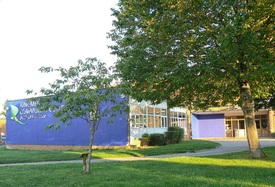
Flying the flag for efficiency is Ringmer Community College, which won ‘Best Green Business’ at this year’s Lewes District Business Awards. The prize has been added to a collection that also includes an Ashden Award (known to many as a ‘Green Oscar’), a National Teaching Award for work on sustainability, an Energy Institute Award, a CPRE Countryside Award and an invitation to Clarence House by HRH The Prince of Wales.
Ringmer County Secondary School, as it was originally called, opened its doors in 1958. “It was built by Ringmer Building Works, which was quite a large local company”, explains Stephen Green, the college’s Environmental Coordinator. “The site was given to the County Council by the Christie family from Glyndebourne, so it was very much a village effort.” And its design was acclaimed from the very beginning, winning a 1959 Civic Trust award with judges commending the “well considered planning, careful handling of form and excellent choice of materials”. But, as Stephen points out, energy wasn’t a major concern because it was relatively cheap.
When the head teacher started looking more closely at environmental issues around ten years ago, Stephen – a former Environmental Health Officer who’d moved into teaching – proposed a scheme that empowered the students. “We’re committed to giving every child at Ringmer an insight into the environmental issues that will influence their lives.” Nominated ‘eco reps’ were asked to audit energy efficiency and propose changes, which led to cost savings. Next came an investigation into renewable energy sources, with eight kilowatts of solar panels fitted to the roof. This was followed by the installation of a small wind turbine for more electricity and then a new biomass boiler that generates heat from locally-produced wood.
An innovative Sixth Form building opened in 2008, featuring exterior solar blinds, passive ventilation systems and ground source heat pumps. (Falling student numbers mean there’ll be no new Sixth Form admissions this month, so the building is now being utilised by other students.) In addition, there have been eco-improvements to the old classrooms. “We borrowed about £35,000 to insulate the walls and the roof spaces… and got a payback on that within four or five years".
Today, Ringmer Community College produces about 60%-70% of its heating energy through the biomass boiler, Stephen tells us, and generates 15%-18% of electricity on site. An extra 30kW solar panel installation is now being planned. “We've managed to demonstrate to students and staff that you can use a 60-year-old building in a way that saves money and improves the environment. Anyone can make a difference.”
First published in Viva Lewes magazine issue 120 September 2016
 RSS Feed
RSS Feed
